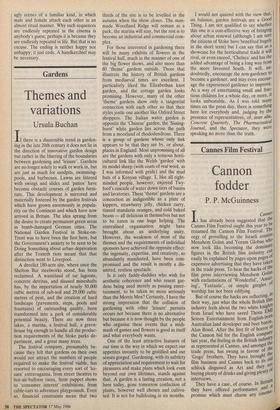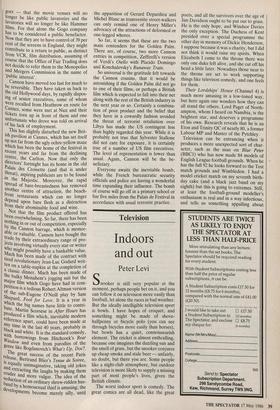Cannes Film Festival _
Cannon fodder
P. P. McGuinness ICannes It has already been suggested that the Cannes Film Festival ought this year to be renamed the Cannon Film Festival. The orgy of grovelling to the Israeli cousins Menahem Golan and Yoram Globus who now look like becoming the dominant figures in the British film industry ca° easily be explained by pages upon pages of expensive advertising that they have taken in the trade press. To hear the hacks of the film press interviewing Menahem Golan with exclamations of 'Wonderful', `Amax' ing', 'Fantastic', or simple gurgles 01 worship has not been edifying. But of course the hacks are reflecting, in their way, just what the whole British On industry feels about the two white knight from Israel who have saved Thorn EMI Screen Entertainment from English-born Australian land developer and beer baron, Alan Bond. After the first fit of horror at the Cannon bid for the English comport)/ last year, the feeling in the British industry as represented at Cannes, and amongst the trade press, has swung in favour of the `Gogo' brothers. They have brought the, film business and Cannes back to its 01° schlock disguised as Art and they are, buying plenty of drinks and giving plenty o' interviews. ,, They have a case, of course. In Britain ' they have offered performance and promise which must charm any cinala- goer — that the movie venues will no longer be like public lavatories and the lavatories will no longer be like Hammer films. For that alone the Gogo company has to be considered a public benefactor. Now that they are to have control of 39 per cent of the screens in England, they might contribute to a return to public, as distinct from VCR, film distribution, assuming of course that the Office of Fair Trading does not decide to refer them to the Monopolies and Mergers Commission in the name of public interest'.
Cannon have moved too fast for much to be reversible. They have taken us back to the old Hollywood days, by rapidly dispos- ing of senior executives, some of whom were recalled from Heathrow en route for Cannes, some were met at Nice and their tickets torn up in front of them and one unfortunate who drove was told on arrival of his lack of employment. This has slightly disturbed the new Brit- ish pavilion at Cannes, which has set itself up not far from the ugly ochre-yellow maze which has been the home of the festival in recent years and far from the declining centre, the Carlton. Now that only the directors' fortnight has its home in the old Palais des Croisette (and that is under threat), aspiring publicists are to be found in the Majestic. Moreover, the rapid spread of bare-breastedness has removed another centre of attraction, the beach- front restaurants which can no longer depend upon bare flesh as a distraction from their abominable food and wine. Not that the film product offered has been overwhelming. So far, there has been nothing in or out of competition, especially by the Cannon barrage, which is memor- able or valuable. Cannon have bought the trade by their extraordinary range of pro- jects involving virtually every star or writer Who might possibly have a bankable value. Much has been made of the contract with tired revolutionary Jean-Luc Godard writ- ten on a table-napkin at the completion of a classic dinner. Much has been made of the bulky Menahem's jogging suit but the major film which Gogo have had in com- petition is a tedious Robert Altman version of the sub-Eugene O'Neill play by Sam Shepard, Fool for Love. It is a year in Which the big names have little to contri- bute. Martin Scorsese in After Hours has Produced a film which, inevitable modern reference apart, could have been made at any time in the last 40 years, probably in black and white. It is the standard comedy, with borrowings from Hitchcock's Rear Window and even from parodies of the genre like Bogdanovich's What's Up, Doc?. The great success of the recent Paris release, Bertrand Blier's Tenue de Soiree, is equally unimaginative, taking old jokes and extracting the laughs by making them cruder and more vulgar. The idea of the seduction of an ordinary shrew-ridden hus- band by a homosexual thief is amusing; the developments become merely silly, until the apparition of Gerard Depardieu and Michel Blanc as transvestite street-walkers can only remind one of Henry Miller's advocacy of the attractions of deformed or one-legged whores.
So far, it seems that these are the two main contenders for the Golden Palm. There are, of course, two more Cannon entries in competition, Zeffirelli's version of Verdi's Otello with Placido Domingo and Konchalevsky's Runaway Train.
So universal is the gratitude felt towards the Cannon cousins, that it would be astonishing if the Golden Palm did not go to one of their films, or perhaps a British film which is expected to fall into their net along with the rest of the British industry in the next year or so. Certainly a combina- tion of poor product and the belief that they have in a cowardly fashion avoided the threat of terrorist retaliation over Libya has made the US contingent less than highly regarded this year. While it is probably not true that Sylvester Stallone did not care for exposure, it is certainly true of a number of US film executives. The level of representation is lower than usual. Again, Cannon will be the be- neficiary.
Everyone awaits the inevitable bomb, while the French bureaucratic security officials and police are having a wonderful time expanding their influence. The bomb of course will go off in a primary school or bar five miles from the Palais de Festival in accordance with usual terrorist practice.



















































 Previous page
Previous page